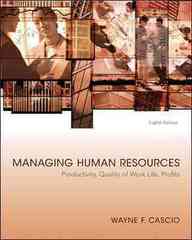1. Are there trade-offs in implementing a ROWE culture? One afternoon last year, Chap Achen, who oversees...
Question:
1. Are there trade-offs in implementing a ROWE culture?
One afternoon last year, Chap Achen, who oversees online orders at Best Buy Co., shut down his computer, stood up from his desk, and announced that he was leaving for the day. It was around 2 p.m., and most of Achen’s staff were slumped over their keyboards, deep in a post-lunch, LCD-lit trance. “See you tomorrow,” said Achen. “I’m going to a matinee.”
Under normal circumstances, an early-afternoon departure would have been totally un-Achen. After all, this was a 37-year-old corporate comer whose wife laughs in his face when he utters the words “work-life balance.” But at Best Buy’s Minneapolis headquarters, similar incidents of strangeness were breaking out all over the ultramodern campus. In employee relations, Steve Hance had suddenly started going hunting on workdays, a Remington 12-gauge in one hand, a Verizon LG in the other. In the retail training department, e-learning specialist Mark Wells was spending his days bombing around the country following rocker Dave Matthews. Single mother Kelly McDevitt, an online promotions manager, started leaving at 2:30 p.m. to pick up her 11-year-old son, Calvin, from school. Scott Jauman, a Six Sigma black belt, began spending a third of his time at his Northwoods cabin.
At most companies, going AWOL during daylight hours would be grounds for a pink slip. Not at Best Buy. The nation’s leading electronics retailer has embarked on a radical—if risky—experiment to transform a culture once known for killer hours and herd-riding bosses. The endeavor, called ROWE, for “results-only work environment,”
seeks to demolish decades-old business dogma that equates physical presence with productivity.
The goal at Best Buy is to judge performance on output instead of hours.
Hence workers pulling into the company’s amenity-packed headquarters at 2 p.m.
aren’t considered late. Nor are those pulling out at 2 p.m. seen as leaving early. There are no schedules. No mandatory meetings. No impression-management hustles. Work is no longer a place where you go, but something you do. It’s OK to take conference calls while you hunt, collaborate from your lakeside cabin, or log on after dinner so you can spend the afternoon with your kid.
Best Buy did not invent the post-geographic office. Tech companies have been going bedouin for several years. At IBM, 40 percent of the workforce has no official office;
at AT&T, a third of managers are untethered. Sun Microsystems Inc. calculates that it has saved $400 million over six years in real estate costs by allowing nearly half of all employees to work anywhere they want. And this trend seems to have legs. A recent Boston Consulting Group study found that 85 percent of executives expect a big rise in the number of unleashed workers over the next five years. In fact, at many companies the most innovative new product may be the structure of the workplace itself..........
Step by Step Answer:






